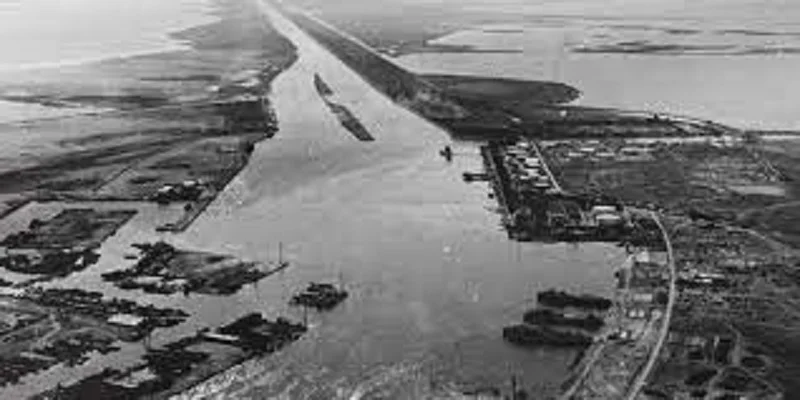Pakistan's Diplomatic Dance in the 1956 Suez Canal Crisis
The Suez Canal crisis was a series of conflicts that culminated in the war between Britain, Israel, and France in the battle against Egypt in 1956 and ended in 1958. The conflict started as a result of the growing Nationalism within Egypt, and significant military offensives initiated by Israel against the Egyptian territories forced president Abdul Nasser to Nationalize the Suez Canal, which was the source of international transportation. Most major trade routes and transports were conducted through this canal, which stopped the entire world's commerce. This was the moment of diplomatic and military conflict between the allies and Egypt. On 26 July 1956, President Abdul Nasser decided to nationalize the canal. To take back control of the canal, which proved to be a destabilizing factor for their economy. In the course of the war, Egypt created ripples throughout the world and, in the end, due to the pressures of the UN and United States allies, were forced to leave without achieving their stated objectives.
Before we analyze Pakistan's policy and stance in this crisis, the Suez Canal background is essential. Following the creation of the Suez Canal, it became the most effective and fastest route connecting the Mediterranean Sea and the Indian Ocean. It was constructed in 1869 by the French finance department and managed by an Egyptian company. Because of financial problems, the company was forced to sell the 44% stake in the canal, which Prime Minister Benjamin Disraeli purchased in 1875. The monopoly on the canal was overthrown by the Egyptian Nationalists shortly after the Second World War when British Empire was about to collapse. On 23 July 1952, following an army coup, Egypt declared the Egyptian Republic and then, eventually, the essential asset to allies; the canal was controlled by the Egyptian government that initiated the Sues Canal crisis, also known as the Sinai or Arab-Israel War.
At the time of the Suez Crisis, the whole world was influenced by it, and the various blocs with mutual interests joined forces. Pakistan, a member of the Commonwealth and an avid partner of the capitalist bloc, wanted her interests and interests to be secured with allies at the official levels. On the national level, the Pakistani stance was widely criticized by the citizens of Pakistan. The crisis garnered much support from the Muslim brothers, who suffered under the attack of three-partite aggression. The administration of Pakistan issued a few reservations and clarifications. At the time, bilateral relations between Pakistan and Egypt were extremely tense. A lot of animosity between the nations was evident because of the initial policy taken by Pakistan in this regard. Following a scathing rebuttal from Pakistani citizens regarding the policy taken by the government, they were forced to reconsider their position towards Egypt. They promised the possibility of assistance to Egypt. However, there were positive steps adopted by Pakistan's government Pakistan like her stance on the rights of Egypt as an independent state to nationalize. Pakistan has offered its assistance to the Egyptian fight against the invasion. It supported the Egyptian demand to remove British occupation troops into the Suez Canal Zone. Pakistan stood up against the joint attack by three forces against Egypt. The situation Pakistan was left to stand took time to establish a solid decision on how to respond to this crisis. On the one hand, it was vital for Pakistan to ensure that the canal remained open, and however, the public pressure was not allowing Pakistan to refuse to help Egypt without a doubt. At first, Pakistan took a policy of restraint and followed the following guidelines.
- Refused to use violence against Egypt.
- The sovereign rights of Egypt to manage the canal were recognized.
- Negotiations were preferable to aggressive.
- Methods were to be discovered to benefit the owner and those who use the canal without abuse.
These issues were addressed to formulate decisions in the context of the Suez Canal Crisis. Thus, a neutral position was adopted by Pakistan as well as the Pakistani government resisted accepting Western or Eastern suggestions. This kind of attitude exacerbated the hostility of the Egyptian government toward Pakistan. Pakistan's proposal to engage an intermediary like the United Nations to solve the problem was rejected with a stern rebuke by the Egyptian government. The idea was seen in the eyes of Egypt as an attack on their sovereign rights. Egyptians as an attack on their sovereign right to include anyone in their internal matters.
In the end, this matter strained the relationship between the two countries at an official level despite being supported by the public and within the country on this issue. The policy on the issue could have been more straightforward and unimportant to come up with solid solutions.

